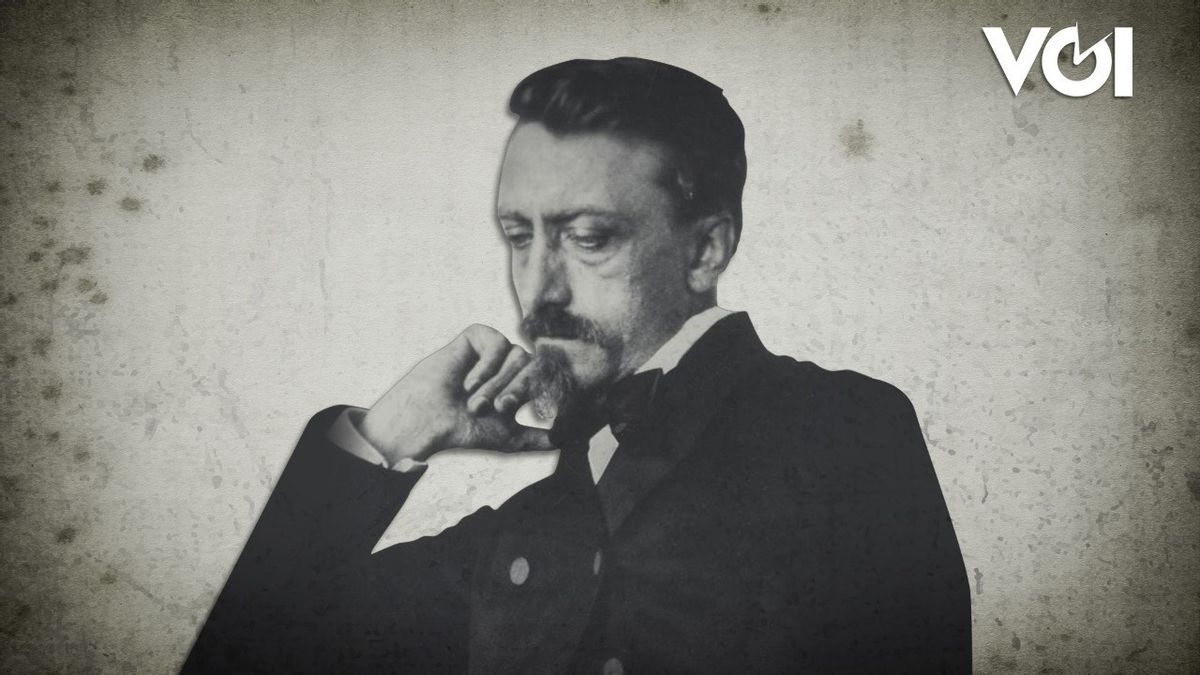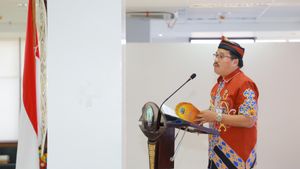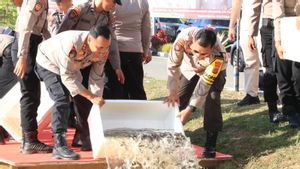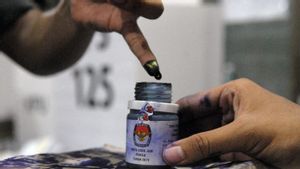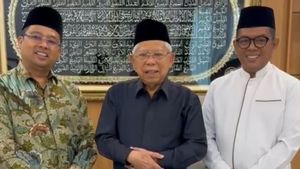JAKARTA - Eduard Douwes Dekker alias Multatuli is a great figure for the Indonesian nation. His phenomenal work, Max Havelaar (1860) inspired many people. Because of his popularity, RA Kartini, Pramoedya Ananta Toer, that Soekarno saw Eduard as a martyr of struggle. Eduard is not only a humanist who fights for justice for the native people. Eduard is also a figure worthy of being remembered for his bravery against colonialism in the Dutch East Indies.
Eduard was born as the son of a merchant ship captain earning enough. Eduard was born in Amsterdam, the Netherlands, on March 2, 1820. For his father's work, Eduard was able to study up to university. Unfortunately, Edward did not have time to complete his education.
His quickly boredom has made his enthusiasm for learning and his achievements in higher education decline. The father then expelled Eduard from school. After that, Eduard was placed by his father in a trading office.
That's where Eduard's adventure with the world of work begins to hone. Long story short, Eduard, who was 18 years old at that time, was invited by his father to sail to the Dutch East Indies using the Dorothe ship. The ship docked in Batavia on January 4, 1839. In Tanah Harapan, Eduard worked as a clerk at Algemen Rekenkamer (State Financial Supervisory Board).
Thanks to his hard work, Eduard was promoted to class II commissioner. At the same time, Eduard enjoyed various assignments as amtenar - government employee - both in West Sumatra, Karawang, Bagelen, Manado, and Ambon.
Quoted by Bonnie Triyana in his writing in Tempo Magazine entitled Honey and Poison in Rangkasbitung (2010), Eduard received help from E. de Wall, his wife's colleague, Everdine Huberte Baronesse van Wijnbergen. With a special lobby from E. de Wall - who later became Minister of Colonies - to the Governor General of the Dutch East Indies Duymaer van Twist, Eduard was appointed assistant resident in Rangkasbitung, Lebak in January 1856.
“The assignment to Rangkasbitung is a new experience for Dekker. Lebak, like several other areas in Banten, was a minus area which became fertile ground for the growth of rebellion. There were at least two major rebellions that occurred in the 19th century: the Haji Wakhia rebellion (1850) and the Banten peasants' rebellion (1888), ”wrote Bonnie.
Eduard showed his hospitality to the Regent of Lebak Raden, Adipati Kartanata Negara. There was no sign that the two were hostile. Eduard even offered money assistance to the Regent several times. Multatuli understands very well that the Regent in fact supports the lives of many people outside the nuclear family. The climax of their relationship can be seen in a letter that was never sent to the Governor General. Said Eduard: The regent was a very pleasant person.
Even though there were some unfavorable signs of the way Raden Adipati Kartanata Negara governed, Eduard did not immediately respond with confrontation. Eduard actually invited the Regent to talk heart to heart. Patih Lebak even described the relationship between the two as good. Patih Lebak described Multatuli as the only Dutch official who spoke softly and kindly.
But that relationship must end. Reality after reality shows how local entrepreneurs exploit their people. Dutch officials seemed to close their eyes to the suffering of the native people. Multatuli was moved. The condition was exacerbated when Multatuli heard reports from the widow of CEP Carolus (former assistant resident of Lebak) about her husband's unnatural death and indications of being poisoned by the local authorities.
Multatuli reacts. He then wrote a letter of complaint to the Resident of Banten Brest van Kempen in Serang. As revealed by Moechtar, in the book Multatuli: Great Author, Little People's Defender, Searcher for Truth and Justice (2005), it is told how Eduard proposed that Nata Negara be tried. The son-in-law of the Regent of Lebak is also proposed to be detained for the unnatural death.
His efforts were in vain. Resident of Banten Van Kempen did not seem interested in the case that Eduard reported. That said, Van Kempen had quite a number of scandals in Banten that made him unable to move more freely. So, Van Kempen chose to be safe.
Because he was deemed 'too noisy', Multatuli was then transferred to Ngawi, East Java. However, he refused the transfer and quit. Right on April 4, 1856 his application for early retirement was granted. In 1858, while in Brussels, Belgium, Multatuli began compiling the stories he encountered in the archipelago. A year later, the story was published as a book called Max Havelaar, published 1960.
Colonialism disturbanceAll experiences and observations about various things, including the abuses that Eduard encountered, he poured into Max Havelaar's book. The contents of the book were not far from harsh criticism of the policies of the Dutch East Indies government. Max Havelaar also denounced the implementation of the forced cultivation system in the archipelago. As a form of totality, his identity as Eduard Douwes Dekker was later changed to Multatuli.
"It literally means: I suffer. At first the book really offended the Dutch rulers because it contained criticism of the bad treatment of the Dutch East Indies government towards the natives. In fact, they thought that Multatuli's opinion was excessive. However, this book is selling well in the European market, "said Joko Darmawan in the book National History: When the Archipelago Speaks (2017).
At the same time, Max Havelaar broke the walls of colonialism. Millions of eyes of Europeans who wanted freedom turned to the Dutch East Indies. As a result, many Dutch people supported the abolition of the forced cultivation system. Jan Breman also revealed this in the book Colonial Profits from Forced Labor: The Priangan System of Forced Coffee Cultivation in Java 1720-1870 (2014).
According to Jan, Eduard was brave enough to expose the lies from a series of good reports from Company officials to headquarters. For Eduard, this was only a form of false optimism that the Governor General of the Netherlands Indies reported to the authorities in the Netherlands.
“And what should the Governor-General do if someone writes a letter to him telling him that the Javanese are being persecuted here and there? The answer is obvious. Such a Governor-General did not need to read the letter, for it was clear that such correspondence would interfere with him in carrying out his duty: protecting the Javanese people. And what if the writer of the complaint letter should not keep writing? So the Governor-General had to express his displeasure, and force him to submit his resignation. Look, that's our system, gentlemen, "wrote Multatuli as quoted by Jan Breman.
Therefore, Multatuli's greatness echoes have inspired many national figures. The poet WS Rendra is one of them. According to Bakdi Soemanto in Rendra's book: He Never Left (2009), many of Rendra's poems emphasized that there was an influence from Multatuli in them. Bakdi said that both of them are like "geckos" that sound everywhere even though we are not happy.
"Even a voice of conscience like Multatuli could be killed. But conscience itself will still live, because every history that gives birth to injustice, it also gives birth to other and new Multatuli-Multatuli, "said Bakdi Soemanto.
For that, the current generation can learn that history does not only give birth to dark stories of the past. However, history also gave birth to voices of conscience who would become major martyrs for change, like Eduard. Either sooner or later, time will be the fairest judge in exposing the injustice that is being voiced.
"We also know how much the echo of Max Havelaar's romance in 1960. Romance was against the colonial government policy that went beyond borders, and in the history of literature it remains a glorious milestone of anti-colonialism before the concept itself was born," concluded Denys Lombard in the book Nusa Jawa Silang. Culture Volume 1 (1996).
The English, Chinese, Japanese, Arabic, and French versions are automatically generated by the AI. So there may still be inaccuracies in translating, please always see Indonesian as our main language. (system supported by DigitalSiber.id)
